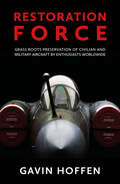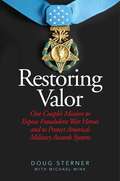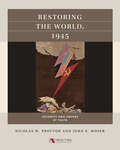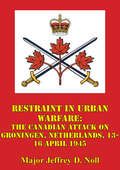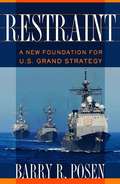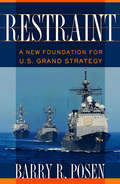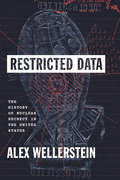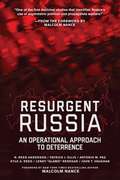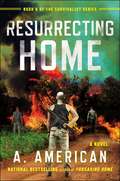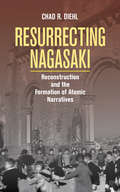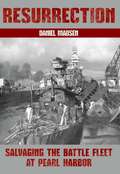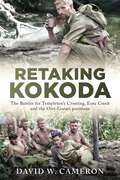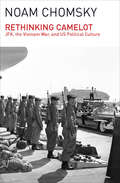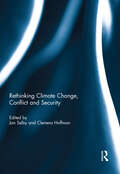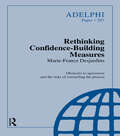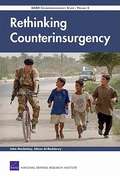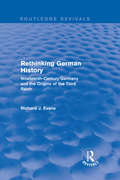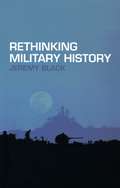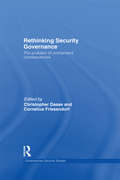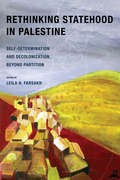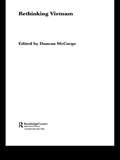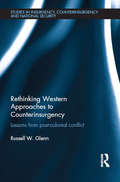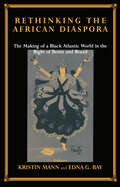- Table View
- List View
Restless: A Novel
by William BoydRestless, as the name implies, is a fast moving (geographically and socially) novel, post WWII England. The war has an impact because the main character is transplanted from Russia to London to spy on her homeland, while equally observant of a few vulnerable Brits. EVA, turned Sally, maintains her cover even to her daughter. Her true identity is revealed further precipitated by affairs of the heart. Restless is replete with intense personal dynamics and their fall-out.
Restoration Force: Grass Roots Preservation of Civilian and Military Aircraft by Enthusiasts Worldwide
by Gavin HoffenWe can all walk into any of the myriad aircraft museums dotted across the world and appreciate the wonderfully restored and preserved exhibits on display. But what about the many gems lovingly brought back to life and hiding away in people’s garages, sheds, barns and gardens? With Gavin Hoffen’s book you become a privileged spectator into a dedicated but often secretive world – to protect their security, names, projects and locations have been limited to the very basics. This is the nostalgic domain of the amateur restorer, hobbyist, and ‘cockpiteer’ of which Gavin is one. Here you will find complete coverage of over 20 projects worldwide with background histories of the aircraft, color photos of the restoration and full information and specifications – be it of cockpit, fuselage, or full aircraft. From Spitfire to Chipmunk, Vulcan to Buccaneer, Piper Aztec to B-52, this is a fascinating insight into an obsession with the romance that aviation once was. A must-see for every aircraft aficionado, and an inspiration for future preservers.
Restoring Valor: One Couple’s Mission to Expose Fraudulent War Heroes and to Protect America’s Military Awards System
by Pam Sterner Doug SternerStolen valor occurs when a person lies about receiving military decorations that he or she has in fact never earned. It has become a major societal problem that has been discussed numerous times in the news and, most recently, by the US Supreme Court. According to The New York Times, the Department of Veterans Affairs paid disability benefits to more than six hundred people falsely claiming to have been POWs in the Vietnam and Persian Gulf wars. The number of stolen valor cases reported to the FBI has tripled in the last decade. In fact, more imposters lie about earning high military declarations for battlefield bravery than the actual number of real-life hero recipients. These imposters trade on tales and the trappings of military valor to secure privileges such as career advancements and even unearned veterans' benefits.Because officially recognized valor is a calling card of trust and courage, many of these imposters "steal" it to invade the lives of people and institutions, for personal gain and often with criminal results. In Restoring Valor, Doug Sterner provides riveting case studies of the stolen valor imposters he's investigated and exposed, and the serious crimes -- including murder -- they've committed. He chronicles the evolution of stolen valor from the inception of the republic to today. Sterner demonstrates why the federal law he and his wife Pam helped to enact, called the Stolen Valor Act, is necessary.
Restoring the World, 1945: Security and Empire at Yalta (Reacting to the Past™)
by Nicolas W. Proctor John E. MoserThe devastation of the Second World War is coming to an end. As victory for the Grand Alliance draws close, the leaders of Great Britain, the Soviet Union, and the United States gather at Yalta, a resort town on the Black Sea, for the most important summit meeting of the war. Can the great powers finalize their plans for a new world order, or will their often antagonistic ideologies prevent them from forging a lasting peace? Restoring the World immerses students in the Yalta Conference as they take on the roles of Churchill, Roosevelt, Stalin, as well as the members of their military and diplomatic delegations. They all want peace, but what kind of peace will they create?
Restraint In Urban Warfare: The Canadian Attack On Groningen, Netherlands, 13-16 April 1945
by Major Jeffrey D. Noll U.S. ArmyUrban terrain presents significant tactical challenges to attacking armies, limiting weapons effects and mobility while disrupting formations and command and control. The human terrain in cities creates a tactical dilemma, placing large civilian populations in close proximity to the fighting. The issue of restraint in urban warfare has been described as a modern phenomenon, with urban warfare in World War II characterized as unlimited. In April 1945, however, the Canadian Army limited its firepower while attacking the city of Groningen, Netherlands to limit damage and civilian casualties. This thesis examines the reasons for these restraints and the methods used to balance those restraints with accomplishment of the mission. The Canadians limited their use of force for political reasons based on intent from the British. They accomplished their mission due to intelligence gained from the friendly population, local fire superiority gained by tanks and flamethrowers, and the ineffectiveness of the poorly organized and equipped German defense. This thesis provides a historical case study of the reasons for restraint in urban warfare and the tactical challenges associated with such limitations.
Restraint: A New Foundation for U.S. Grand Strategy
by Barry R. PosenThe United States, Barry R. Posen argues in Restraint, has grown incapable of moderating its ambitions in international politics. Since the collapse of Soviet power, it has pursued a grand strategy that he calls "liberal hegemony," one that Posen sees as unnecessary, counterproductive, costly, and wasteful. Written for policymakers and observers alike, Restraint explains precisely why this grand strategy works poorly and then provides a carefully designed alternative grand strategy and an associated military strategy and force structure. In contrast to the failures and unexpected problems that have stemmed from America's consistent overreaching, Posen makes an urgent argument for restraint in the future use of U. S. military strength. After setting out the political implications of restraint as a guiding principle, Posen sketches the appropriate military forces and posture that would support such a strategy. He works with a deliberately constrained notion of grand strategy and, even more important, of national security (which he defines as including sovereignty, territorial integrity, power position, and safety). His alternative for military strategy, which Posen calls command of the commons, focuses on protecting U. S. global access through naval, air, and space power, while freeing the United States from most of the relationships that require the permanent stationing of U. S. forces overseas. "
Restraint: A New Foundation for U.S. Grand Strategy
by Barry R. PosenThe United States, Barry R. Posen argues in Restraint, has grown incapable of moderating its ambitions in international politics. Since the collapse of Soviet power, it has pursued a grand strategy that he calls "liberal hegemony," one that Posen sees as unnecessary, counterproductive, costly, and wasteful. Written for policymakers and observers alike, Restraint explains precisely why this grand strategy works poorly and then provides a carefully designed alternative grand strategy and an associated military strategy and force structure. In contrast to the failures and unexpected problems that have stemmed from America's consistent overreaching, Posen makes an urgent argument for restraint in the future use of U.S. military strength.After setting out the political implications of restraint as a guiding principle, Posen sketches the appropriate military forces and posture that would support such a strategy. He works with a deliberately constrained notion of grand strategy and, even more important, of national security (which he defines as including sovereignty, territorial integrity, power position, and safety). His alternative for military strategy, which Posen calls "command of the commons," focuses on protecting U.S. global access through naval, air, and space power, while freeing the United States from most of the relationships that require the permanent stationing of U.S. forces overseas.
Restricted Data: The History of Nuclear Secrecy in the United States
by Alex Wellerstein“Groundbreaking . . . Wellerstein peels back the layers of the nuclear onion to reveal a rich debate about what should be kept secret and why.” —NatureThe first full history of US nuclear secrecy, from its origins in the late 1930s to our post–Cold War present.The American atomic bomb was born in secrecy. From the moment scientists first conceived of its possibility to the bombings of Hiroshima and Nagasaki and beyond, there were efforts to control the spread of nuclear information and the newly discovered scientific facts that made such powerful weapons possible. The totalizing scientific secrecy that the atomic bomb appeared to demand was new, unusual, and very nearly unprecedented. It was foreign to American science and American democracy—and potentially incompatible with both. From the beginning, this secrecy was controversial, and it was always contested. The atomic bomb was not merely the application of science to war, but the result of decades of investment in scientific education, infrastructure, and global collaboration. If secrecy became the norm, how would science survive? Drawing on troves of declassified files, including records released by the government for the first time through the author’s efforts, Restricted Data traces the complex evolution of the US nuclear secrecy regime from the first whisper of the atomic bomb through the mounting tensions of the Cold War and into the early twenty-first century. A compelling history of powerful ideas at war, it tells a story that feels distinctly American: rich, sprawling, and built on the conflict between high-minded idealism and ugly, fearful power. “Wellerstein examines the health of democracy in the face of big science, big government, and big weapons.” ―Science
Resurgent Russia: An Operational Approach to Deterrence
by Malcolm Nance R. Reed Anderson Patrick J. Ellis Antonio M. Paz Kyle A. Reed Lendy Alamo" Renegar John T. VaughanRelations between the United States and Russia have recently escalated from strained to outright aggressive. From imperial expansion in Ukraine to intervention in Syria to Russian hacking during the US election in 2016, it is clear that the United States must be prepared to defend itself and its NATO allies against Russian aggression.Resurgent Russia, researched and written by six residents and internationally experienced officers at the US Army War College, analyzes the current threat of Russian acts of war—both conventional military attacks and unconventional cyber warfare or political attacks—against the United Stated and NATO. The officers detail how the America can use its international military resources and political influence to both prepare for and deter aggression ordered by Vladimir Putin, making it clear that such an attack would be unsuccessful and therefore keeping the peace. This study provides a clear assessment of how the United States and its allies must utilize their political and military power to deter Russian aggression and maintain the hierarchy of power in today’s world.
Resurrecting Home
by A. AmericanBOOK 5 OF THE SURVIVALIST SERIES Against all odds, Morgan Carter and his family have endured despite the deteriorating conditions surrounding them. Armed with survivalist tactics, Morgan's crew, alongside their new friends from the recently-liberated DHS camp, have worked together to build a sustainable communuity. But not all situations can be prepared for. When a massive wildfire threatens their very existence, they must decide: fight or flight? From the author of the hit Survivalist Series books, Resurrecting Home is an action-packed adventure that depicts the harrowing possibilities of a world gone awry, and the courage it takes to protect what matters most.
Resurrecting Nagasaki: Reconstruction and the Formation of Atomic Narratives (Studies of the Weatherhead East Asian Institute, Columbia University)
by Chad R. DiehlIn Resurrecting Nagasaki, Chad R. Diehl explores the genesis of narratives surrounding the atomic bombing of August 9, 1945, by following the individuals and groups who contributed to the shaping of Nagasaki City's postwar identity. Municipal officials, survivor-activist groups, the Catholic community, and American occupation officials all interpreted the destruction and reconstruction of the city from different, sometimes disparate perspectives. Diehl's analysis reveals how these atomic narratives shaped both the way Nagasaki rebuilt and the ways in which popular discourse on the atomic bombings framed the city's experience for decades.
Resurrection
by Daniel MadsenThe attack on Pearl Harbor is a topic of perennial interest to the American public, and a long line of popular books and movies have focused on the attack or events leading up to it. This work takes an entirely new perspective. Aimed at the general reader with an interest in World War II and the U.S. Navy, the book looks at the massive salvage effort that followed the attack, beginning with the damage control efforts aboard the sinking and damaged ships in the harbour on 7 December 1941 and ending in March 1944 when salvage efforts on the USS Utah were finally abandoned. The author tells the story in a narrative style, moving from activity to activity as the days and months wore on, in what proved to be an incredibly difficult and complex endeavour. But rather than writing a dry operational report, Dan Madsen describes the Navy's dramatic race to clear the harbour and repair as many ships as possible so they could return to the fleet ready for war. Numerous photographs, many never before published in books for the general public, give readers a real appreciation for the momentous task involved, from the raising of the USS Oglala in 1942 and the USS Oklahoma in 1943 to the eventual dismantling of the above-water portions of the USS Arizona. Madsen explains how a salvage organization was first set up, how priorities were scheduled, what specific plans were made and how they worked or, in many cases, did not work. His book is based almost entirely on primary sources, including the records of the fleet salvage unit and the Pearl Harbor Naval Shipyard.
Retail Marketing
by J. BlythmanFirst published in 2004, Retail Marketing is a valuable contribution to the field of Military & Strategic Studies.
Retaking Kokoda: The Battles for Templeton's Crossing, Eora Creek and the Oivi-Gorari positions
by David W. CameronJapanese Major General Horii Tomitarô, commanding the South Seas Force, had the Australians on the back foot. Australia was holding the last defendable ridge in the Owen Stanley ranges, Imita Ridge. Horii to his distress was then given orders from Imperial Headquarters in Tokyo that he was to fall back across the mountains to the Japanese beachheads at Gona, Sanananda, and Buna, leaving a force between Templeton’s Crossing and Eora Creek to stop any Australian advance through the mountains. The Japanese, unknown to the Australians evacuated Ioribaiwa Ridge just before they launched their attacks and to their amazement on storming the heights, the Australians encountered no resistance – the Japanese had gone. <p><p> This, however, did not mean the fighting on the Kokoda Track was over, far from it. Three more desperate actions would be fought by the Australians and Japanese, before the decisive battles for the Japanese beachheads could be decided – the battles for Templeton’s Crossing, Eora Creek, and finally the Oivi-Gorari positions on the northern lowland plains. Just 15-kilometres east lay the Kumusi River, the last geographical barrier before reaching the strongly fortified Japanese beachheads themselves.
Rethinking Camelot: JFK, the Vietnam War, and U.S. Political Culture
by Noam ChomskyThe famed political critic &“analyzes the issue most prominently posed in Oliver Stone&’s film JFK . . . strong arguments against Kennedy mythologists&” (Publishers Weekly). Rethinking Camelot is a thorough analysis of John F. Kennedy&’s role in the US invasion of Vietnam and a probing reflection on the elite political culture that allowed and encouraged the Cold War. In it, Chomsky dismisses efforts to resurrect Camelot—an attractive American myth portraying JFK as a shining knight promising peace, foiled only by assassins bent on stopping this lone hero who would have unilaterally withdrawn from Vietnam had he lived. Chomsky argues that US institutions and political culture, not individual presidents, are the key to understanding US behavior during Vietnam. Rethinking Camelot is &“an interesting work not only for the history it explores, but also as a study of how various individuals and groups write and interpret history&” (Choice). Praise for Noam Chomsky &“Chomsky is a global phenomenon . . . perhaps the most widely read voice on foreign policy on the planet.&” —The New York Times Book Review &“The conscience of the American people.&” —New Statesman &“Reading Chomsky is like standing in a wind tunnel. With relentless logic, Chomsky bids us to listen closely to what our leaders tell us—and to discern what they are leaving out . . . The questions Chomsky raises will eventually have to be answered. Agree with him or not, we lose out by not listening.&” —Business Week &“One of the radical heroes of our age . . . a towering intellect . . . powerful, always provocative.&” —The Guardian
Rethinking Climate Change, Conflict and Security
by Jan Selby and Clemens HoffmannIs global climate change likely to become a significant source of violent conflict, and should it therefore be seen as a national security challenge? Most Northern governments, militaries, think tanks and NGOs believe so, as do many academic researchers, on the grounds that increased temperatures, changing precipitation patterns and rising sea levels will worsen existing social stresses, especially within poor societies and marginal communities across Africa and Asia. This book argues otherwise. The first collection of its kind, it brings together leading scholars of Anthropology, Geography, Development Studies and International Relations to provide a series of critical analyses of mainstream thinking on the climate-security nexus. It shows how policy discourse on climate conflict consistently misrepresents the causes of violence, especially by obscuring its core political dimensions. It demonstrates that quantitative research provides a flawed basis for understanding climate-conflict linkages. It argues that climate security discourse is in hoc with a range of questionable military, authoritarian and developmental agendas. And it reveals that the greening of global capitalism is already having violent consequences across the global South. Climate change, the book argues, does indeed have serious conflict and security implications – but these are quite different from how they are usually imagined.This book was published as a special issue of Geopolitics.
Rethinking Confidence-Building Measures (Adelphi series)
by Marie-France DesjardinsConfidence-Building Measures (CBMs) - often seen as the fastest growing sector on the post-Cold War diplomatic agenda - are increasingly viewed by the international community as useful instruments for addressing a range of security and diplomatic issues. Rethinking Confidence-Building Measures warns against an uncritical pursuit of CBMs, arguing that the idea has been oversold. The author asserts that obstacles to meaningful agreements are much more important than usually acknowledged, and the political and military ramifications have been generally ignored. She concludes that the same effort, painstaking negotiation, and possibilities for failure are inherent in CBMs as in the wide array of other potential solutions for managing interstate security relations, but with far fewer substantial results.
Rethinking Counterinsurgency
by Alison Al-Baddawy John MackinlayDuring the period of decolonization in Asia and Africa, the United Kingdom faced more insurgent activity than any other Western power. British government officials and military forces proved proficient at defeating or controlling these rebellions. However, these uprisings were much less complex than the modern jihadist insurgency. Past insurgent movements were primarily monolithic or national in form, had very specific local goals, and derived most of their power from the local population. These limitations made past rebellions vulnerable to strong military responses. In contrast, the modern jihadist insurgency is characterized by its complex and global nature. Unlike past insurgent forms that aspired to shape national politics, the jihadist movement espouses larger thematic goals, like overthrowing the global order. The modern jihadist insurgency is also more global in terms of its popular support and operational territory. It makes far better use of communications technology and propaganda to reach the minds and hearts of global audiences. The contemporary international security environment has therefore become a frustrating place for Western powers. Despite great technological and military advances, British and U.S. counterinsurgency (COIN) operations have been slow to respond and adapt to the rise of the global jihadist insurgency. Operational failures in Iraq and Afghanistan have highlighted the need for the West to rethink and retool its current COIN strategy. After analyzing past British COIN experiences and comparing them to the evolving nature of the modern jihadist insurgency, the authors suggest a new framework for future COIN operations.
Rethinking German History: Nineteenth-Century Germany and the Origins of the Third Reich (Routledge Revivals)
by Richard J. EvansIn Rethinking German History, first published in 1987, Richard J. Evans argues for a social-historical approach to the German past that pays equal attention to objective social structures and subjective values and experiences. If German history has been seen as an exception to the ‘normal’ development of Western society, this is not least because historians have until recently largely failed to look beyond the world of high politics, institutions, organizations and ideologies to broader historical problems of German society and German mentalities. By applying and adapting approaches learned from French and British social history as they have been developed over the last quarter of a century, it is possible to achieve a rethinking of German history which does away with many of the textbook myths that have encrusted the historiogrpahy of Germany for so long. This book will be valuable for students of German history and politics, and brings together essays widely used in teaching. Its broad coverage of social history will also be useful to all those interested in contemporary historiography or the comparative study of European history.
Rethinking Military History
by Jeremy BlackRethinking Military History is a bold new 'thought book' that reconsiders military history at the beginning of the twenty-first century. The chapters provide a valuable and concise survey of the main themes in the study of military history from 1500 to the present day as Jeremy Black reveals the main trends in the practice and approach to mili
Rethinking Security Governance: The Problem of Unintended Consequences (Contemporary Security Studies)
by Christopher DaaseThis book explores the unintended consequences of security governance actions and explores how their effects can be limited. Security governance describes new modes of security policy that differ from traditional approaches to national and international security. While traditional security policy used to be the exclusive domain of states and aimed at military defense, security governance is performed by multiple actors and is intended to create a global environment of security for states, social groups, and individuals. By pooling the strength and expertise of states, international organizations, and private actors, security governance is seen to provide more effective and efficient means to cope with today’s security risks. Generally, security governance is assumed to be a good thing, and the most appropriate way of coping with contemporary security problems. This assumption has led scholars to neglect an important phenomenon: unintended consequences. While unintended consequences do not need to be negative, often they are. The CIA term "blowback," for example, refers to the phenomenon that a long nurtured group may turn against its sponsor. The rise of al Qaeda, which had benefited from US Cold War policies, is only one example. Raising awareness about unwanted and even paradoxical policy outcomes and suggesting ways of avoiding damage or limiting their scale, this book will be of much interest to students of security governance, risk management, international security and IR. Christopher Daase is Professor at the Goethe University Frankfurt and head of the research department International Organizations and International Law at the Peace Research Institute Frankfurt (PRIF/HSFK). Cornelius Friesendorf is lecturer at the Goethe University Frankfurt and research fellow at the Peace Research Institute Frankfurt (PRIF/HSFK).
Rethinking Statehood in Palestine: Self-Determination and Decolonization Beyond Partition (New Directions in Palestinian Studies #4)
by Leila H. FarsakhA free open access ebook is available upon publication. Learn more at www.luminosoa.org. The quest for an inclusive and independent state has been at the center of the Palestinian national struggle for a very long time. This book critically explores the meaning of Palestinian statehood and the challenges that face alternative models to it. Giving prominence to a young set of diverse Palestinian scholars, this groundbreaking book shows how notions of citizenship, sovereignty, and nationhood are being rethought within the broader context of decolonization. Bringing forth critical and multifaceted engagements with what modern Palestinian self-determination entails, Rethinking Statehood sets the terms of debate for the future of Palestine beyond partition.
Rethinking Vietnam (Rethinking Southeast Asia)
by Duncan McCargoA uniquely comprehensive overview of a fascinating and rapidly changing country, dealing with the politics, economics, society and foreign policy of Vietnam from the Doi Moi reforms of market socialism in 1986 to the present day. Drawing on fieldwork and analysis by an international team of specialists this book covers all aspects of contemporary Vietnam including recent history, the political economy, the reform process, education, health, labour market, foreign direct investment and foreign policy. The contributors show how the blurring of old and new pressures and traditions within Vietnam requires a more complex analysis of the country than might initially be assumed.
Rethinking Western Approaches to Counterinsurgency: Lessons From Post-Colonial Conflict (Studies in Insurgency, Counterinsurgency and National Security)
by Russell W. GlennThis book critically examines the Western approach to counter-insurgency in the post-colonial era and offers a series of recommendations to address current shortfalls. The author argues that current approaches to countering insurgency rely too heavily on conflicts from the post-World War II years of waning colonialism. Campaigns conducted over half a century ago – Malaya, Aden, and Kenya among them – remain primary sources on which the United States, British, Australian, and other militaries build their guidance for dealing with insurgent threats, this though both the character of those threats and the conflict environment are significantly different than was the case in those earlier years. This book addresses the resulting inconsistencies by offering insights, analysis, and recommendations drawn from campaigns more applicable to counter-insurgency today. Eight post-colonial conflicts; to include Northern Ireland, Sierra Leone, Colombia and Iraq; provide the basis for analysis. All are examples in which counterinsurgents attained or continue to demonstrate considerable progress when taking on enterprises better known for disaster and disappointment. Recommendations resulting from these analyses challenge entrenched beliefs to serve as the impetus for essential change. Rethinking Western Approaches to Counterinsurgency will be of much interest to students of counter-insurgencies, military and strategic studies, security studies and IR in general.
Rethinking the African Diaspora: The Making of a Black Atlantic World in the Bight of Benin and Brazil
by Kristin Mann Edna G. BayAs a result of new research, we can now paint a more complex picture of peoples and cultures in the south Atlantic, from the earliest period of the slave trade up to the present. The nine papers in this volume indicate that a dynamic and continuous movement of peoples east as well as west across the Atlantic forged diverse and vibrant re-inventions and re-interpretations of the rich mix of cultures represented by Africans and peoples of African descent on both continents.

